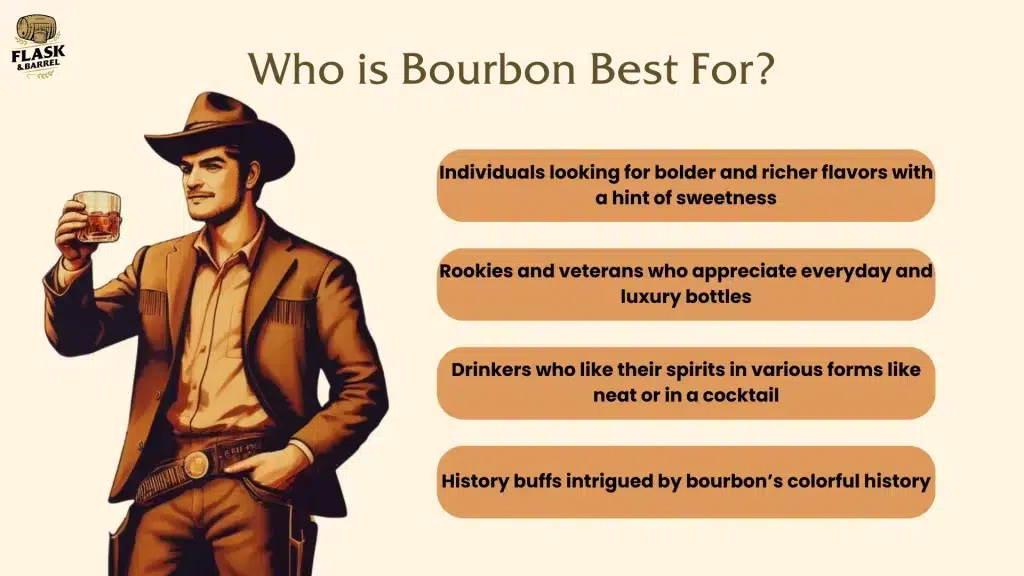Bourbon, often hailed as America’s native spirit, shines brightly in the vast constellation of whiskey. It distinguishes itself with a robust character and a rich tapestry of history that is deeply woven into the American cultural fabric. This distinctive spirit boasts a boldness and complexity that sets it apart, marking Bourbon as a category with a proud identity and a loyal following.
At the heart of Bourbon’s allure are its core varieties, including Straight Bourbon, Small Batch Bourbon, and Single Barrel Bourbon, each bringing a unique flavor profile to the table. Additionally, Bottled-in-Bond and Cask Strength Bourbons offer aficionados a deeper dive into the spirit’s potency and purity, showcasing the craftsmanship behind this celebrated American whiskey. Delving further, each type of Bourbon reveals a palette of tastes, production methodologies, historic milestones, and pairing suggestions with cuisine.
The subsequent sections will delve into these elements in depth, offering a comprehensive insight into why Bourbon holds a revered place in the hearts of spirit enthusiasts across the globe.
The Defining Characteristics of Irish Whiskey
Irish Whiskey is renowned for its smoothness and complexity, a hallmark achieved through its distinctive production process. Traditionally, it is distilled three times and aged in oak barrels for at least three years, a practice that imbues the spirit with a wide spectrum of flavors, from light and floral to rich and woody. A key differentiator is the inclusion of unmalted barley in the mash bill, alongside malted barley, which lends a distinctive creamy texture and a hint of sweetness.

Examples of Irish Whiskey brands that exemplify these characteristics include Jameson, known for its versatility and smoothness, and Redbreast, which offers a richer, more complex flavor profile with hints of fruit, spice, and wood. These brands showcase the range of flavors and textures that can be achieved within the category, from the approachable and easy-drinking qualities of Jameson to the depth and richness of Redbreast. This careful balance of ingredients and process ensures that Irish Whiskey offers a refined and approachable drinking experience, capturing the essence of Ireland’s storied distilling legacy.
The Defining Characteristics of Bourbon
Bourbon is distinguished by its boldness and depth of flavor, a direct result of precise production criteria. Crafted exclusively in the United States, it must contain a grain mixture that is at least 51% corn, attributing to its characteristic sweetness. Aging occurs in new, charred oak barrels, which infuse the spirit with complex vanilla, caramel, and woody notes.

The distillation process ensures that Bourbon does not exceed 160 proof, and it is aged at no more than 125 proof, fostering a robust yet smooth flavor profile. These standards not only carve out Bourbon’s distinctive taste but also underscore its strong ties to American heritage and the art of distilling. To illustrate, notable Bourbon brands such as Maker’s Mark and Buffalo Trace exemplify these defining characteristics.
Maker’s Mark, known for its smooth and approachable profile, offers a rich palate of vanilla and caramel, with a soft finish that appeals to both newcomers and connoisseurs alike. Buffalo Trace, on the other hand, showcases a more robust profile with deep woody notes, a testament to its aging process in new, charred oak barrels. These brands, among others, highlight the diversity within Bourbon, from the subtle nuances of flavor to the bold expressions of America’s whiskey-making tradition.
In What Ways Are They Similar?
Irish Whiskey and Bourbon, while distinct in their characteristics, share core similarities that anchor them within the whiskey world. Both spirits undergo the crucial distillation process and are aged in wooden barrels, essential for developing their rich flavors and aromas. Furthermore, they each have geographical indications—Irish Whiskey must be crafted in Ireland, and Bourbon is uniquely American, showcasing the significance of their respective origins.
In What Ways Are They Different?
Irish Whiskey and Bourbon present a study in contrast, shaped by their distinct production methods, ingredients, and resultant flavor profiles. Irish Whiskey is characterized by its triple distillation process and the inclusion of both malted and unmalted barley, contributing to a smoother, often more fruit-forward taste. For example, Redbreast 12 Year Old is a quintessential Irish Whiskey that showcases the smooth, complex profile typical of the triple distillation process, offering notes of fruit, toasted wood, and spice.
On the other hand, Bourbon’s signature richness and depth come from its minimum 51% corn composition, coupled with aging in new, charred oak barrels, lending it pronounced vanilla and caramel flavors. A prime example of this is Woodford Reserve Distiller’s Select, a Bourbon that exemplifies the rich, full-bodied character with its deep flavors of vanilla, oak, and spice. The geographical designation of each not only dictates the spirit’s nomenclature but also influences its flavor, with Irish Whiskey reflecting Ireland’s lush landscape and Bourbon embodying the robust character of America.

These distinctions underscore the unique cultural and historical narratives each spirit carries, offering a rich tapestry of experiences for whiskey aficionados. The production method of Irish Whiskey, often involving pot stills and a combination of malted and unmalted barley, contrasts with Bourbon’s use of column stills and a mash bill dominated by corn. This fundamental difference in production and ingredients results in the distinctive taste profiles that set Irish Whiskey and Bourbon apart.
Comparing Irish Whiskey and Bourbon
In the exploration of Irish Whiskey and Bourbon, the comparison transcends simple flavor analysis to include a wide array of differences and similarities. The flavor profile is a primary aspect, with Irish Whiskey often presenting a smoother, lighter touch, whereas Bourbon is noted for its richer, more robust character. The price range for both spirits varies, accommodating both everyday consumers and serious collectors, reflecting their broad appeal.
Distinct production processes further distinguish them, from the grains selected to the specific barrel aging requirements, highlighting the crafts’ traditional aspects. Additionally, both spirits enjoy varying levels of popularity and critical acclaim across different regions, influenced by cultural tastes and historical contexts. This comparative overview not only sheds light on the unique attributes of each whiskey type but also celebrates the rich diversity and heritage inherent in the whiskey tradition.
Comparing Their Flavor
| Irish Whiskey Example | Flavor Notes | Bourbon Example | Flavor Notes |
|---|---|---|---|
| Redbreast 12 Year Old | Smooth, nutty, and spicy with hints of fruit | Buffalo Trace | Vanilla, caramel, and oak with a spicy backdrop |
| Green Spot | Light and floral, with sweet pear and apple notes | Woodford Reserve | Rich with dried fruit, vanilla, and tobacco spice |
Comparing Their Price Range
| Type | Irish Whiskey Price Range | Bourbon Price Range |
|---|---|---|
| Entry-Level | $20 – $40 | $15 – $35 |
| Mid-Tier | $40 – $80 | $35 – $60 |
| Premium | $80+ | $60+ |
Comparing Their Distillation Process
| Aspect | Irish Whiskey | Bourbon |
|---|---|---|
| Distillation | Often triple distilled for smoothness | Distilled at a lower proof to retain rich flavors |
| Grains | Mix of malted and unmalted barley | At least 51% corn |
| Aging Barrels | Used oak barrels | New, charred oak barrels |
Comparing Their Popularity
| Region | Irish Whiskey Popularity | Bourbon Popularity |
|---|---|---|
| United States | Growing interest, especially in craft and premium segments | Highly popular, with a strong domestic market |
| Europe | Steady popularity, with a strong base in the UK and Ireland | Increasing interest, particularly in premium products |
| Asia | Emerging market, with a growing appreciation for premium spirits | Expanding market, especially in Japan and China |
Comparing Their Critical Acclaim
| Award/Recognition | Irish Whiskey | Bourbon |
|---|---|---|
| World Whiskies Awards 2020 | Teeling Single Malt – Best Irish Single Malt | Elijah Craig Barrel Proof – Best Bourbon |
| San Francisco World Spirits Competition 2020 | Jameson Black Barrel – Double Gold | Blanton’s Single Barrel – Double Gold |
Who Is Irish Whiskey Best For?
Irish Whiskey is the perfect choice for those who value a smooth, approachable spirit with a storied past. Its gentle flavors—encompassing fruit, vanilla, and a touch of spice—make it an inviting option for whiskey novices as well as connoisseurs looking for a versatile spirit that shines whether served neat, with water, or in a cocktail. With a spectrum of styles, from easy-drinking blends to complex single malts, Irish Whiskey caters to a broad audience, ensuring a satisfying experience for quiet reflection or celebratory occasions.

Irish Whiskey is particularly suited for:
- Casual Drinkers: Its smoothness makes it accessible for those new to whiskey, easing them into the world of spirits without the harshness found in some other types of whiskey.
- Cocktail Enthusiasts: The versatility of Irish Whiskey allows it to be the star of both classic and modern cocktails, appealing to those who enjoy crafting drinks at home.
- Celebratory Occasions: Whether it’s St. Patrick’s Day, a wedding toast, or simply a gathering of friends, Irish Whiskey is a fitting choice that adds a touch of elegance and tradition.
- Reflective Sippers: For those who appreciate the art of whiskey tasting, the complex single malts offer a depth of flavor that rewards contemplation and savored moments.
It stands as a testament to the welcoming nature of whiskey, offering a gateway to the rich diversity the category has to offer. Whether you’re enjoying a quiet night in or celebrating a momentous occasion, Irish Whiskey provides a smooth, flavorful experience that’s hard to match.
Who Is Bourbon Best For?
Bourbon caters to those who appreciate a bold, rich flavor and the spirit’s deep roots in American tradition. Its characteristic sweetness, thanks to the corn base, along with the complexity from new, charred oak barrel aging, offers a broad appeal. Ideal for whiskey aficionados and newcomers alike, Bourbon provides a full-bodied experience perfect for sipping neat, on the rocks, or as the foundation of classic cocktails like the Old Fashioned and Mint Julep.

With a spectrum from everyday bottles to luxurious, aged variants, Bourbon stands as a versatile and rewarding choice for both everyday moments and celebratory occasions, embodying the essence of American whiskey craftsmanship. For those who relish the art of cocktail making, Bourbon’s versatility shines through in both simple and complex recipes, making it a staple in any home bar. Its rich flavor profile also makes it a favorite among culinary enthusiasts, who use it to add depth to sauces, desserts, and marinades.
Whether you’re a history buff intrigued by Bourbon’s storied past, a traveler seeking to explore the Kentucky Bourbon Trail, or someone who enjoys the ritual of unwinding with a well-crafted drink, Bourbon offers a multifaceted experience that caters to a wide range of tastes and interests.

![[object Object]](https://theflaskandbarrel.com/wp-content/uploads/2024/07/dall-e-2024-07-11-12.48.26-a-simplified-illustration-of-two-men-drinking-whiskey.-one-man-is-drinking-irish-whiskey-depicted-with-dark-hair-wearing-a-flat-cap-and-traditional-.webp)



